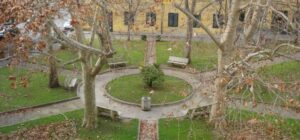
The Department of Agricultural, Food and Environmental Sciences was founded by the Marquis Cosimo Ridolfi in 1840 and it was the first Agricultural School founded in Italy and it is the oldest seat of Agricultural Science studies in the world. Back then, three-quarters of Italians lived and worked in the countryside; today, in developed countries, only a small fraction of the workforce is employed in the primary sector, but the ecosystem services provided by this sector and by the management of rural areas are essential for the well-being and economic development of the community. In this sense, the contribution of Agricultural Sciences is central to fully understand and respond to the main challenges of the coming decades, which include food security in all its meanings, the transition towards the circular economy and the bioeconomy, the improvement of life quality in urban and rural areas, and the conservation and enhancement of the natural landscape and environmental resources. In other words, Agricultural Sciences are called to support the country in the challenges of creating prosperity and sustainability in agri-food production systems, combining the production of private goods with the supply of public goods or co-creating sustainable and resilient agri-food systems to climate change factors.
In this context, the Department of Agricultural, Food and Agro-environmental Sciences’ mission is to produce (research) and spread (teaching) technological innovation of high quality and socio-economic impact to respond to the current and future needs of the community. The connections with society are strengthened by the provision of services for the community (third mission) in order to convert the knowledge generated into economic and social opportunities.
With its study programme, the Department intends to provide its students with bachelor’s and master’s degrees, master’s and PhD courses with a solid basic and specialised preparation, combined with the critical awareness necessary to proactively face the continuous challenges that professionals, producers and all the figures involved in the agro-food chains and, more generally, in the sectors of conservation and management of local resources have to face. Training programmes include lectures, experiences in the laboratory and in the field. “Knowing” combined with “knowing how” and “knowing how to be” are the pillars on which the department’s policy is based for the cultural growth of its students, to provide them with adequate tools useful for constant adaptation to new realities and to land and maintain over time important and increasingly better job positions, but also for personal growth, which is helpful to their vocation. To achieve these objectives, teachers promote, coordinate and carry out basic and applied research activities daily, which involve aspects ranging from the molecular to the systemic level, usually from an interdisciplinary and transdisciplinary perspective. Moreover, the connection with producers, institutions and other research centres in Italy and abroad is very close.
